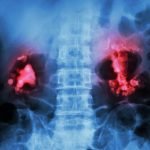A Case Study of Familial Heart Disease: An exploration of Tolle causam
Arcoma L. Gonzalez Lambert, ND
Tolle causam, treatment of the cause, is the way patients wind up in our office. Many times we are tricked by the system we are operating from, being insurance-based in many cases, or our board’s version of their own guidelines. When a patient comes to us, we do a physical examination, make a diagnosis, treat the cause, perform coding, and send a thank you card. But what if this is not our job? We know we have to do these things as part of our making a living, but what if we could do all of this and treat the cause?
XY is a 40-year-old man, in no apparent distress, who presents with a family history of heart disease: his father died at age 56 of heart events after 2 heart attacks in his forties. XY has already had his first heart attack. He comes into my office to overcome his fate and not have his father lying next to him in 15 years.
I look at him. He is a funny, articulate man, slightly uncomfortable when sitting, because he has just completed a most-detailed document. It is 12 pages of questions, completely designed to elicit answers from him to narrow my focus so I can spend an hour exploring the cause. During this interview, I do not have to ask mundane questions, because he has spent time answering them. I will assess his familial heart disease, diagnose hyperlipidemia (for which he already is taking a statin), diagnose hypertension (for which he is already taking Lisinopril), and assess his risk of stroke (for which he is already taking baby aspirin and other anticlot medications). I will do a full physical examination (which is grossly normal) and ask for a release of records to get prior laboratory work. I could spend an hour doing what my conventional counterparts do in 1-3 minutes.
As a naturopathic doctor, my job is to go deeper into the cause of the problem, to address the person as an individual, not a carbon copy of his father. Even considering his father’s conventional medications and advice, this is the farthest consideration on which we should spend our time. We explore the cause. What is the cause? As I continue asking more-detailed questions, I realize I am becoming too in depth in my questioning. The cause is bigger, not smaller; I will not find it with little parts and pieces. So, I ask general questions like, “What about your health bothers you the most?” He says his erections are nonexistent in the morning. Loss of morning erections in a 40-year-old? “When did it happen?” I ask. “It came on gradually over the last 10 years,” he says. My algorithm starts shooting out if/then scenarios. I have to assume that his blood pressure was not too high for 10 years because he was not on a blood pressure medicine until his heart attack last year. Why would a 40-year-old man have a 10-year history of erectile dysfunction?
Testing
Because I did not have any laboratory results on hand, I took a chance and asked, “Do you believe that you have ever been tested for testosterone?” He said, “Yes, it has been low for a long time; they gave me a gel that I never use because it doesn’t help.” I later find out that AndroGel, 50 mg, 1% gel (that is a 5-mg dose per day) was prescribed for a testosterone level of 358 (range, 440-1100). If used regularly, that gel would barely put him inside the range and would net no improvement of symptoms or morbidity.
Considering the conventional approach, “If a man doesn’t have symptoms, you shouldn’t even test [for low testosterone],” says Karen Herbst, MD, PhD, an endocrinologist with the University of California at San Diego. “There’s no proof that treating low testosterone in the absence of symptoms has any benefits. But men with symptoms of [low testosterone] will benefit from treatment (from WEBMD).” We have to suppose that the symptoms 10 years ago were probably mild and deemed not worth treating from a conventional view. There are symptoms, and there are signs. We must suppose that he was experiencing a slight and seemingly insignificant rise in blood pressure over the years. His blood results were showing slightly higher cholesterol and triglyceride levels, which lead to higher arterial plaque levels. He was experiencing a silent and slight dilation of the coronary arteries and other major arteries, decreasing the space in which the blood must flow and increasing fibrinogen levels that increase the likelihood of a blood clot blocking a major artery, resulting in a heart attack.
At this point, we know that he had only 10 years of erectile dysfunction, which got slightly worse, along with other mild symptoms that he soldiered through. If I could have accurate answers from 10 years ago, I could assess whether his testosterone level was low, but this was not tested. It was only tested after his heart attack. I must assume that these factors were accumulating so slowly that neither the doctor nor the labs put them together as any kind of problem. But now, with hindsight being 20/20, we see that his testosterone loss over time had been accumulating.
Tolle Causam
Tolle causam—we are charged with a responsibility to discover and treat the underlying cause of the disease. The fascinating part of this case is that the signs, symptoms, and laboratory work were all there in little pieces, gradually headed toward a heart attack. The body was communicating and doing its job of “laying out the bread crumbs” to follow. Somewhere between changing doctors, changing insurances, seeing a specialist, soldiering on, having some embarrassment about talking about erections, and the nature of the Pavlovian reaction to medicine, the cause was missed, not taken seriously enough, undertreated, under-diagnosed, and we find the patient at this juncture. What is a naturopathic doctor to do at this time?
I have a system that gathers information (the intake packet). A medical assistant begins by taking the patient’s vital signs. I keep SOAP notes that I fill out to keep me asking the right questions, an NCNM-trained mind that sees this person in front of me as an individual, and I have all the information I have gathered above. What I do not do next is replace all of the above medications with their natural counterparts and up the dosages to make them work better, change his diet and lifestyle, hug him on the way out, and pat myself on the back. What I have to do is treat the cause. I must discover why his testosterone level is low and whether there are any other low hormone levels. If his testosterone level is low, he is headed for more heart attacks and heart-related illness, so why not just optimize his testosterone level and declare victory? It all comes back to why. We are the only doctors who will take the time to figure out why. The patient deserves to know why; he may have sons who could have the same fate. We go where no one has ever gone. And we take the step that has not been taken before. By the time I write the next article, I will tell you the why for this patient. Thank you for your curiosity and continuing to find the cause for each patient. Tolle causam!
 Arcoma Gonzalez Lambert, ND is an alumni of the National College of Natural Medicine. She has published several peer reviewed articles for ND Updates, includ-ing many on heart related illnesses, and authored or co-authored the article for AANP on Hypertension with Dr. Martin Milner.Dr. Gonzalez is an internationally recognized authority on avoidable causes of cardiopulmonary diseases, particularly unknowing exposures to industrial pollutants in air, water, the workplace (heavy metal exposures), and consumer products. After finding the true cause of the illness, she is particularly adept at dietary, nutritional, exercise, and rehabilitation using the strengths of naturopathic medicine.
Arcoma Gonzalez Lambert, ND is an alumni of the National College of Natural Medicine. She has published several peer reviewed articles for ND Updates, includ-ing many on heart related illnesses, and authored or co-authored the article for AANP on Hypertension with Dr. Martin Milner.Dr. Gonzalez is an internationally recognized authority on avoidable causes of cardiopulmonary diseases, particularly unknowing exposures to industrial pollutants in air, water, the workplace (heavy metal exposures), and consumer products. After finding the true cause of the illness, she is particularly adept at dietary, nutritional, exercise, and rehabilitation using the strengths of naturopathic medicine.
References
Hoffman M. Low Testosterone Explained: How Do You Know When Levels Are Too Low? Web MD. http://men.webmd.com/features/low-testosterone-explained-how-do-you-know-when-levels-are-too-low. Assessed July 13, 2010.









